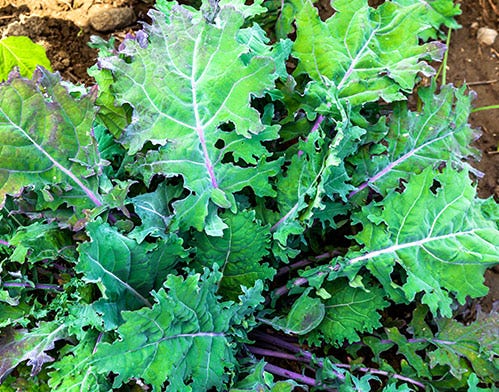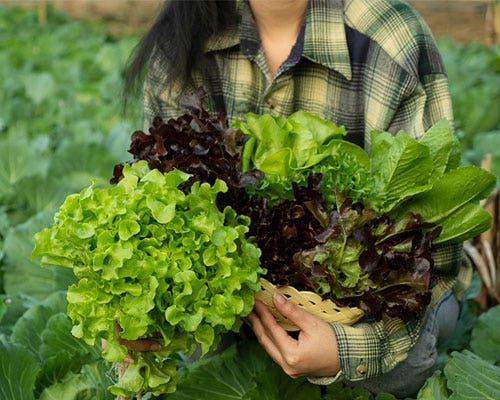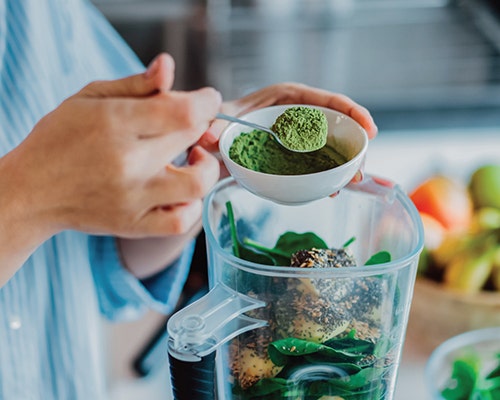Crazy Good Organic Kale
- 12/26/16

[vc_row css=".vc_custom_1501592910802{padding-right: 0px !important;padding-left: 0px !important;}"][vc_column el_id="text-content" css=".vc_custom_1501593086296{padding-right: 0px !important;padding-left: 0px !important;}"][vc_column_text el_id="text-body"]Kale is crazy good for you, but before highlighting its nutrient profile, here’s a little backdrop on it.
Kale is a leafy green veggie belonging to the Brassica family, a grouping of veggies including Brussels sprouts, cabbage and collards which are getting a lot of attention for their sulfur-containing phytonutrients that provide many health benefits.
You also have choices with your kale, since there are several varieties, including curly kale, ornamental kale, and Lacinato or Tuscan kale. All differ in taste, texture and appearance, so you can mix them up.
And while you can get kale any time of the year, you’re in for a kale treat from the middle of winter through early spring—now—because that’s when fresh kale is generally in-season and not only more widely available, but also has a sweeter taste due to the frosty temps where it’s grown.
Now for more about kale’s nutrients.
Kale is a nutritional powerhouse because not only is it low in calories, but it’s also a good source of dietary fiber, protein, thiamin, riboflavin, folate, iron, magnesium and phosphorus. Additionally, it is a very good source of vitamin A, vitamin C, vitamin K, vitamin B6, calcium, potassium and manganese.
In fact, below is the breakout of vitamins and minerals—percentage of Daily Value (DV)—you get in just one cup of raw kale. Here goes:
Additionally, there are isothiocyanates, or ITCs, made from kale’s gluconsiniolates, which also provide their own special brand of health perks to empower extraordinary health.
And get a load of this: there are also over 45 different flavonoids in kale, including kaempferol and quercetin, which provide amazing health benefits.
Wow—45 different flavonoids!
Unfortunately, an even higher number of 55 comes into play if your kale is not Certified USDA Organic. That’s right. Conventionally grown kale can have up to 55 pesticide residues on it, including 6 known or probable carcinogens; 22 suspected hormone disruptors; 10 neurotoxins; 10 developmental or reproductive toxins and 17 honeybee toxins.
Organic kale—a delicious, nutritious way to get many vitamins, minerals and other health-supporting nutrients.
Kale is a leafy green veggie belonging to the Brassica family, a grouping of veggies including Brussels sprouts, cabbage and collards which are getting a lot of attention for their sulfur-containing phytonutrients that provide many health benefits.
You also have choices with your kale, since there are several varieties, including curly kale, ornamental kale, and Lacinato or Tuscan kale. All differ in taste, texture and appearance, so you can mix them up.
And while you can get kale any time of the year, you’re in for a kale treat from the middle of winter through early spring—now—because that’s when fresh kale is generally in-season and not only more widely available, but also has a sweeter taste due to the frosty temps where it’s grown.
Now for more about kale’s nutrients.
Kale is a nutritional powerhouse because not only is it low in calories, but it’s also a good source of dietary fiber, protein, thiamin, riboflavin, folate, iron, magnesium and phosphorus. Additionally, it is a very good source of vitamin A, vitamin C, vitamin K, vitamin B6, calcium, potassium and manganese.
In fact, below is the breakout of vitamins and minerals—percentage of Daily Value (DV)—you get in just one cup of raw kale. Here goes:
- Vitamin K—684%
- Vitamin A—206%
- Vitamin C—134%
- Manganese—26%
- Potassium—9%
- Calcium—9%
- Vitamin B6—9%
- Iron—6%
- Magnesium—6%
- Thiamin—5%
- Riboflavin—5%
- Folate—5%
Additionally, there are isothiocyanates, or ITCs, made from kale’s gluconsiniolates, which also provide their own special brand of health perks to empower extraordinary health.
And get a load of this: there are also over 45 different flavonoids in kale, including kaempferol and quercetin, which provide amazing health benefits.
Wow—45 different flavonoids!
Unfortunately, an even higher number of 55 comes into play if your kale is not Certified USDA Organic. That’s right. Conventionally grown kale can have up to 55 pesticide residues on it, including 6 known or probable carcinogens; 22 suspected hormone disruptors; 10 neurotoxins; 10 developmental or reproductive toxins and 17 honeybee toxins.
Organic kale—a delicious, nutritious way to get many vitamins, minerals and other health-supporting nutrients.





